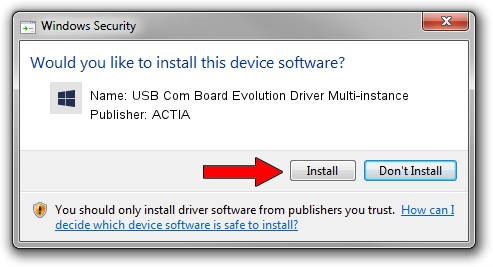
Actia Usb Com Board Driver
USB Com Board Evolution Driver ( Multi-instance ) Drivers Driver Information Old drivers impact system performance and make your PC and hardware vulnerable to errors and crashes. Download the latest drivers for your Actia Others to keep your Computer up-to-date. USB Com Board Driver ( UMDF ) Download: Actia: USB Com Board Evolution Driver.
USB Com Board Evolution Driver ( Multi-instance ) is a windows driver. It's released by Type: Version: 4.0.0.0 Date: 2006-12-21 Hardware IDs: USB Vid_103a&Pid_f008&Rev_0100 USB Vid_103a&Pid_f008 Compatible IDs: USB Class_ff&SubClass_ff&Prot_00 USB Class_ff&SubClass_ff USB Class_ff The following operating system has used this driver: Microsoft Windows XP Professionnel This download is valid for the product(s) listed below: LENOVO - TP-6D___ Notices: The software drivers provided on this page are generic versions and can be used for general purposes. However, computer original equipment manufacturers (OEMs) may have altered the features, incorporated customizations, or made other changes to the software or software packaging they provide.
To avoid any potential installation incompatibilities on your OEM system, We recommend that you check with your OEM and use the software provided via your system manufacturer. We or the computer original equipment manufacturer (OEM) may not provide technical support for some or all issues that could arise from the usage of this generic version of software drivers.
Warning UMDF 2 is the latest version of UMDF and supersedes UMDF 1. All new UMDF drivers should be written using UMDF 2. No new features are being added to UMDF 1 and there is limited support for UMDF 1 on newer versions of Windows 10. Universal Windows drivers must use UMDF 2.
24 September 2012.  Retrieved 19 August 2013. Retrieved 19 August 2013.
Retrieved 19 August 2013. Retrieved 19 August 2013.
For more info, see. The framework represents each USB device as a framework USB device object. A UMDF driver must create a framework USB device object before the driver can access the framework's support for USB I/O targets. UMDF provides USB device object methods that enable a UMDF driver to: • • • • Creating a UMDF-USB Device Object To use the framework's USB I/O target capabilities, a UMDF driver must first obtain a pointer to the interface. To obtain the pointer, the driver must call the QueryInterface method of the device's interface. The following code example shows how to call QueryInterface to obtain the pointer: hr = pdevice->QueryInterface(IID_IWDFUsbTargetFactory, (LPVOID*)&ppUsbTargetFactory); The driver must next call the method to create a USB I/O target object for the device.
After the driver creates the USB I/O target, the driver can send requests to the I/O target. Typically, drivers call IWDFUsbTargetFactory::CreateUsbTargetDevice from within an callback function. After the driver calls IWDFUsbTargetFactory::CreateUsbTargetDevice, the driver can (for example, USB descriptors for the device, USB interfaces, and interface endpoints). The USB descriptors are described in the USB specification.
Obtaining UMDF-USB Device Information After a UMDF driver calls the method to create a UMDF-USB target device object, the driver can call the following methods that the USB target device object defines for obtaining information about a USB device: Obtains a device's USB device descriptor. Obtains the number of USB interfaces that the device supports.
Obtains a pointer to a interface that exposes one of the USB interfaces that the device supports. Retrieves capability information that is associated with a USB device. Retrieves a WinUsb power policy. Obtains the WinUsb interface handle that is associated with the I/O target device object.